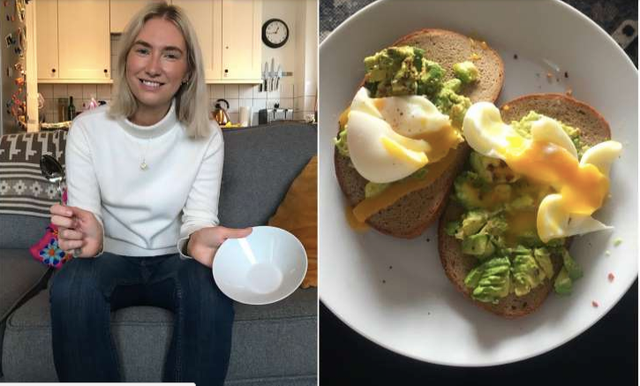What will you get after 3 weeks of skipping breakfast?
Suốt cuộc đời, chúng tôi được nghe rằng bữa sáng là bữa ăn quan trọng nhất trong ngày, và rằng không ăn sáng thậm chí có thể khiến bạn tăng cân...
 |
Nhưng giờ đây một số người lập luận rằng mối liên hệ từ lâu giữa bữa sáng và sức khỏe tốt chỉ là chuyện "dọa ma" do các công ty sản xuất ngũ cốc ăn sáng nghĩ ra.
Hiện có rất nhiều tranh cãi xung quanh khái niệm về việc nhịn ăn không liên tục, và thậm chí có nhiều bằng chứng chỉ ra những lợi ích sức khỏe thực sự của việc nhịn ăn đối với cả cơ thể và não bộ.
Nhiều người mẫu và người nổi tiếng, bao gồm Miranda Kerr và Beyonce, đều cam đoan về những chế độ nhịn ăn khác nhau.
There's the 5:2 diet, where you eat whatever you want five days a week, but restrict your calories to just 500 calories a day on two "fasting" days, or the 16:8 diet, where you eat within an eight-hour window, and fast for the other 16. There's also The 2 Meal Day, which requires you to eat just two meals a day, and skip breakfast or dinner.
Some people have a hard time sticking to a strict diet. Restricting certain foods only makes you crave them more, and counting calories can be boring.
If you're intrigued by the concept of fasting and whether incorporating it into your diet fits into your lifestyle, you may decide to make a small change to your daily routine by skipping breakfast for a few weeks.
With some fasting advocates claiming that skipping breakfast can give you more energy, make you eat less, and even lose weight, it seems worth a try.
If you don't want to commit to two meals a day, you can allow yourself to snack during your non-fasting hours, so even though you typically eat breakfast every day, it doesn't feel like a sacrifice.

Here's what Rosie Fitzmaurice shares about what happens when you skip breakfast for three weeks:
With more and more evidence showing the real health benefits of fasting, I decided to change my daily routine a bit by skipping breakfast for 2 weeks to see if and how it would impact me.
I've interviewed a number of personal trainers and fitness influencers who say they eat a big breakfast, and that's when they get their carbs for the day because they have the rest of the day to digest it.
So I often assume that eating a bigger breakfast will make me eat less during the day – although I’ve never tested this theory. Personally, I crave a hearty breakfast and tend to eat a lot of toast, eggs and avocado for breakfast both on weekdays and weekends.
For this experiment, I decided to skip breakfast every morning, creating a fasting window of 15 to 16 hours a day. This means I eat dinner no later than 8 or 9 pm, and have another meal in the middle of each day.
Because I didn't eat until noon, I had to rely on coffee to get me through the morning - but the rations didn't change.
I normally drink at least one, often two, cups of coffee every morning, so I figured I'd drink more while fasting. I'd heard before that caffeine can be used as an appetite suppressant while fasting, but I found my coffee intake didn't really change.
Maybe because I drink almost 4 liters of water a day.
While fasting, I drank more water than usual. Normally I feel guilty about not always drinking the recommended 2 liters of water, but in this experiment, I drank 1.5 to 2 liters of water in the morning even before eating anything.
I would continue to drink water throughout the afternoon, so I was up to almost 4 liters of water a day by the second half of the three-week trial. And the habit has stuck with me ever since.
The growling of the stomach is so embarrassing...
Skipping breakfast wasn't the problem - the problem was not eating the pieces of fruit provided by the office kitchen, where I usually snacked in the morning in addition to breakfast.
I was expecting headaches or hunger pangs, but nothing like that, just really loud stomach growling - not ideal while working. And it didn't go away for a few days.
...And it doesn't stop in week 2, which is just as tough as week 1.
By the second week, my stomach was still nagging me. In fact, there were days when I felt worse than the first week.
By around 11:10, I was hungry again and my stomach was growling, so I made it a habit to eat some fruit that I had prepared in advance to eat at exactly 12 o'clock. Just eating it at the table in the last 15 minutes of my fast seemed to motivate me.
The growling made me feel quite distracted for the first two weeks of the trial, and I didn't get the energy boost that some people claim.
Fasting is really, really hard in the morning after a few drinks...
The first week I skipped breakfast I went out for a few drinks with a friend that I had planned weeks ago. The next morning I was starving and could barely concentrate at work. I wasn’t hungover, but I really wanted to grab some bread or something with carbs to wash it down.
... Or the morning after a workout.
The morning after my first workout of the trial, I was still really hungry, despite having had a plate of pasta after leaving the gym the night before.
This was the aspect of the experiment that I will never forget – it seemed pointless to fast until noon the next day when I had exercised the night before, but I persisted in continuing with the plan I had set.
However, I find that I am saving money.
I spend less money on food, not just because I don't buy breakfast anymore, but because I have to plan ahead.
When you are planning to fast for 15 or 16 hours, you need to make sure you have the right food to eat when the fast ends, because you will be very hungry. I don't want to have to wait at the supermarket to buy lunch when I am hungry, so I have been much better at bringing leftovers or storing food at work for lunch.
It also made me more mindful of what I put into my body...
From a psychological perspective, it seems unwise to satisfy hunger with unhealthy foods, so I've been eating more healthy foods overall.
As with any diet, it made me re-evaluate what I was eating, and I became more conscious of eating balanced meals. This extended to dinner, as an example can be seen above.
...And I ate less in general.
I found that even though there was a longer than usual period of not eating, I didn't find myself eating more during the non-fasting hours. I generally ate the same amount of food throughout the rest of the day as I normally would.
This could also be because I drink a lot of water, but I find myself listening to my body more about whether I'm hungry or thirsty.
While not counting calories, it seems I eat less, and am well on my way to a calorie deficit.
Weekends are usually easier than workdays.
Fasting until noon the next day on weekends was much easier than on weekdays, except for the first Sunday of the experiment when I forgot about fasting and had a piece of leftover pizza from the night before for breakfast.
This is hardly surprising, however, as I usually wake up late and will have a breakfast-cum-lunch instead of breakfast.
I got through the difficulty in week 3.
I originally planned to skip breakfast for only two weeks, but by the end of the second week I felt like I was past the hardest part and things started to get a lot easier.
Fasting doesn't prevent me from eating breakfast foods – I just eat them later in the day.
I didn't eat the lunch/breakfast pictured above until 3pm on the second weekend of the experiment, and it felt really easy. The next day I waited until 3:30 to eat. I could feel a pattern starting to emerge so I decided to skip breakfast for another week.
After the experiment, I rewarded my efforts with a breakfast from a high-end restaurant — and it left me feeling bloated, tired, and hungrier.
I officially ended the experiment on Tuesday, but over the next few days I still didn't feel hungry until midday. On Friday, I decided to reward my efforts with a Pret brioche breakfast, a breakfast I usually treat myself to at the end of the week.
I found it made me really full, sleepy and by 12 I was hungry for lunch again. By the end of the day I found myself eating more than I had on the days I skipped breakfast.
Skipping breakfast changed the way I eat — and it had other benefits, too.
The best thing that came from the experiment was a significant increase in water intake.
While I didn't notice any significant changes in weight loss during the three-week trial, it did make me rethink what I was putting into my body. The process made me question why I was eating: out of habit, boredom, or genuine hunger?
I also feel like I've achieved something, by exercising self-control and not eating as soon as I feel a little hungry.
I no longer want to eat at the table just because it's breakfast time. Likewise, I won't restrict myself the day after a workout if I'm hungry in the morning.
However, I naturally feel hungry much later than before - and I eat less throughout the day.

